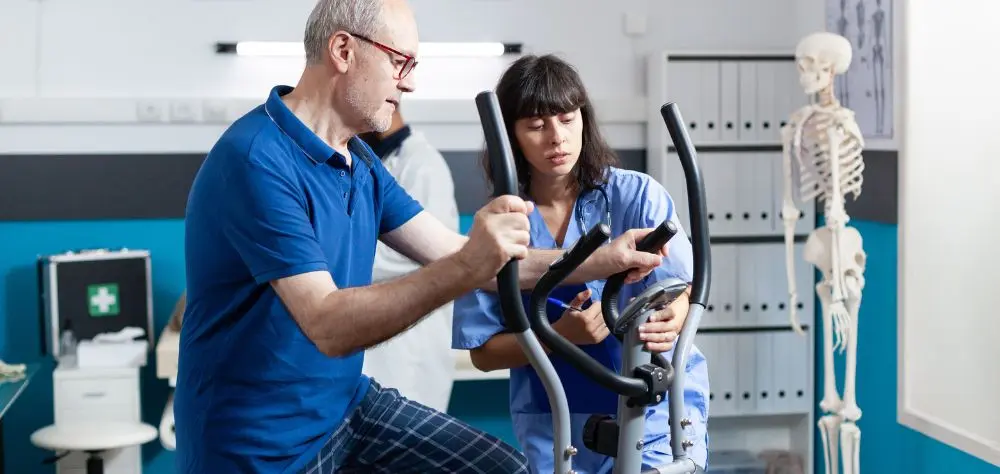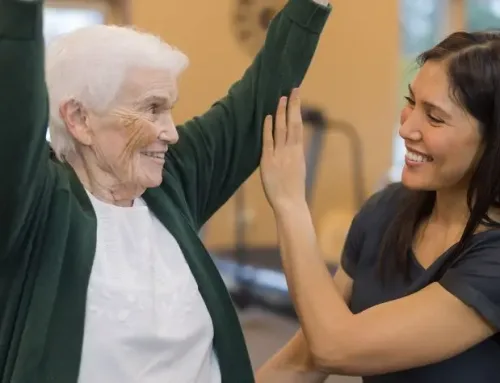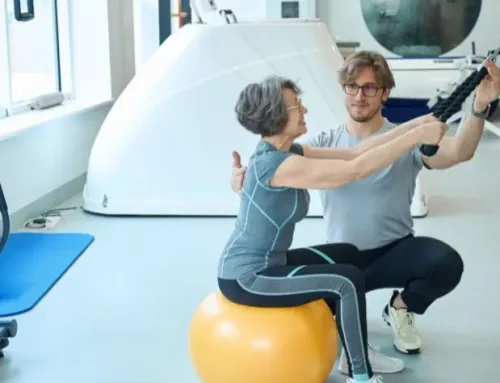What is an OTD Degree? Benefits, Requirements, and Career Outcomes

The Doctor of Occupational Therapy (OTD) is reshaping the future of the profession. As healthcare evolves, so does the role of occupational therapists—and more are choosing the OTD to deepen their clinical expertise, lead programs, contribute to research, and specialize in emerging areas like telehealth, mental health, and assistive technology.
At Southern California University of Health Sciences (SCU), we’ve designed our OTD to meet that demand with flexibility, relevance, and results. Our hybrid program in our California Campus blends online learning with hands-on training, and with mentorship from experts like Dr. Heather Thomas, students gain more than academic knowledge—they learn from voices shaping the profession today.
Whether you’re transitioning from an OTA role, returning to school, or looking to specialize, SCU’s OTD gives you the structure, support, and leadership foundation to thrive in a changing healthcare landscape. Let’s explore what the degree offers—and where it can take you.
What Sets an OTD Apart?
Our Doctor of Occupational Therapy (OTD) degree is designed for those who want to elevate their impact—clinically and professionally. It builds on foundational OT skills with deeper training in leadership, program development, research, and emerging technologies.
- More Than Just Patient Care – At SCU, OTD students are trained to see the whole picture—body, mind, and environment. Rooted in a whole health philosophy, our curriculum equips you not only with advanced therapy techniques but also with the tools to lead, advocate, and design programs that improve care on a broader, holistic scale.
- Capstone Project – You will engage in designing a new OT program, conducting groundbreaking research, or developing innovative therapeutic interventions.
- Cutting-Edge Training – SCU’s curriculum integrates emerging tools that today’s employers expect: virtual reality therapy simulations, 3D printing for adaptive devices, and simulated anatomy suites. SCU’s tech-rich approach ensures you graduate ready for modern, multidisciplinary settings—from hospitals to digital health startups..
- More Hands-On Experience – OTD students typically complete more clinical hours and gain deeper expertise than those in traditional Masters of Occupational Therapy (MOT) programs, making them more competitive in the job market.
Why More OTs Are Choosing the OTD
A decade ago, most occupational therapists entered the field with a master’s degree. Now, more employers are preferring (or requiring) OTD graduates, and many universities are phasing out master’s programs altogether. Here’s why:
- More Career Opportunities – An OTD can lead to specialized roles, administrative positions, as a stepping stone to a PhD., or with years of experience, to a faculty role in itself.
- Higher Salary Potential – Advanced training = more earning power. OTD graduates are often in higher demand and qualify for leadership and specialized positions with better pay.
- Future-Proofing Your Career – As OT continues to evolve, the OTD may become the standard. Earning it now means you’ll be ahead of the curve, not catching up later.
If you’re serious about making an impact in OT and setting yourself up for long-term success, an OTD is a game-changer.
What It Takes to Earn an OTD: Requirements & Expectations
Thinking about earning a Doctor of Occupational Therapy degree? Whether you’re an occupational therapy assistant (OTA) looking to advance, a student without a bachelor’s degree, or someone switching careers, you might be wondering who qualifies and what the program actually involves.
The good news? OTD programs are more accessible than many people realize, with flexible entry pathways and hybrid learning options. From admission requirements to hands-on clinical training, here’s what to expect when pursuing an OTD.
Who Can Apply?
Unlike many advanced degrees, SCUHS’ OTD programs offer multiple entry points to accommodate different educational backgrounds:
- Bachelor’s Degree Route – Many programs require a bachelor’s in a related field, such as kinesiology, psychology, or health sciences.
- OTA to OTD Bridge Program– Some programs allow licensed OTAs to apply with qualifying coursework instead of a full bachelor’s degree.
- No Bachelor’s? – SCUHS allows students to start with just 90+ college credits, eliminating the need for a full four-year degree.
This flexibility makes an OTD more accessible than many people realize, allowing students to fast-track their way into the field without unnecessary delays.
What to Expect: Coursework, Hands-On Training & the Capstone Project
Coursework & Curriculum
OTD programs blend advanced clinical training with leadership, research, and emerging technology. Expect to dive into:
- OT Theory & Interventions – Master evidence-based treatment techniques for diverse populations.
- Neuroscience & Biomechanics – Learn how the brain and body interact in recovery and rehabilitation.
- Healthcare Leadership & Ethics – Prepare for management roles and advocacy in healthcare policy.
- Research & Evidence-Based Practice – Develop skills in data analysis, clinical research, and program evaluation.
- Cutting-Edge Learning Tools – Many programs integrate VR, 3D modeling, and telehealth simulations to enhance hands-on training.
Hands-On Clinical Training
While OTD programs include online coursework, they also require real-world clinical experience:
- Level I & II Fieldwork – Students complete supervised clinical rotations in hospitals, outpatient clinics, schools, and rehabilitation centers.
- Hybrid Programs Offer Local Fieldwork – Many schools work with students to secure placements near their home, making it easier to complete training without relocating.
- On-Campus Intensives with Standardized Patients – During scheduled on-ground weeks, students come to campus to practice essential skills and techniques in simulated settings with standardized patients, bridging the gap between coursework and clinical readiness.
Doctoral Capstone Project: A Defining Feature of the OTD
One of the most important components of an OTD program is the doctoral capstone project. This is where students take everything they’ve learned and apply it to real-world occupational therapy challenges. Unlike traditional research papers, the capstone is designed to drive meaningful change in the field—whether that’s through developing new therapy techniques, designing innovative OT programs, or contributing to critical research. The capstone isn’t just an academic requirement—it’s a chance to make a lasting impact in the OT profession while setting yourself apart in the job market.
Earning an OTD is more flexible and attainable than many people think, with multiple pathways to admission and a curriculum designed for real-world success. Whether you’re moving up from an OTA role, entering without a bachelor’s, or looking to specialize, an OTD provides the training, hands-on experience, and leadership skills to take your OT career to the next level.
Leadership, Research, or Private Practice? Career Options with an OTD
Whether you want to lead a rehab team, shape the future of OT education, start your own practice, or break into cutting-edge fields like telehealth and adaptive technology, earning a Doctor of Occupational Therapy can take your career in directions you might not have imagined.
Expanding Your Role in Clinical and Leadership Positions
An OTD doesn’t mean leaving patient care—it means bringing advanced skills and leadership into clinical settings. Many graduates continue working in hospitals, rehab centers, outpatient clinics, and skilled nursing facilities, but with a greater ability to specialize, mentor, and take on leadership roles.
- More room for specialization in areas like neurorehabilitation, pediatrics, and mental health.
- Higher earning potential and career mobility within multidisciplinary healthcare teams.
Moving into Leadership & Administration
For those who want to shape healthcare from the top down, an OTD is a stepping stone into management and executive roles. Graduates often transition into:
- Director of Rehabilitation positions in hospitals and therapy centers.
- Healthcare consulting and program development, influencing policies and patient care models.
Breaking into Academia, Research & Entrepreneurship
If you’re passionate about mentoring the next generation of OTs or driving innovation in the field, an OTD makes it possible to step into academia and research roles. Many OTD grads:
- Become university faculty members, including both teaching faculty and clinical faculty, guiding and supporting future occupational therapists.
- Lead groundbreaking research in areas like assistive technology, neuroplasticity, and sensory integration.
Launching a Private Practice or Consulting Career
For those with an entrepreneurial mindset, an OTD can open doors to owning a practice, developing new OT tech, or working as a consultant in rapidly growing industries.
- Private practice owners specialize in niche therapy services, from hand therapy to telehealth.
- Corporate wellness and ergonomics consultants help companies design safer, healthier workplaces.
- Tech-driven OTs develop assistive devices, adaptive equipment, and telehealth platforms.
Advance Your OT Career Faster with SCU’s Flexible Doctor of Occupational Therapy Program
At SCU, we believe in breaking barriers and expanding opportunities in occupational therapy. That’s why we designed our Doctor of Occupational Therapy (OTD) program to be as flexible as it is rigorous. Whether you’re an OTA looking to advance or a student without a bachelor’s degree, we make it possible to earn your doctorate in just over two years.
A Flexible Pathway to Your Doctorate
No Bachelor’s? You Can Still Earn Your OTD
Unlike most programs that require a bachelor’s degree, we offer a direct-entry pathway for students with just 90+ college credits. This makes our program ideal for:
- OTAs who want to transition into a full occupational therapist role without spending extra years in school.
- Career changers looking to fast-track their way into the OT profession.
- Students who want to accelerate their clinical experience.
Hybrid Format: Study from Anywhere, Train In-Person
We know flexibility matters. That’s why our program is 80% online, allowing you to complete coursework from home while still gaining the hands-on training essential to occupational therapy.
- Live online classes and interactive learning let you engage with faculty and peers from anywhere.
- In-person labs are just three weeks at the end of each term, so you get real-world experience without relocating.
- Fieldwork placements are arranged near your home whenever possible, so you can gain clinical experience in a setting that fits your career goals.
A Career-Driven OTD with Built-In Benefits
Earn Additional Certifications While You Study
We go beyond the basics by helping students earn extra credentials that give them an edge in the job market. As you complete your OTD, you’ll also be earning hours toward:
- California Physical Agent Modality (PAM) certification, which allows you to provide advanced therapeutic treatments.
- The American College of Lifestyle Medicine (ACLM) certification, which qualifies you to integrate lifestyle-based interventions into your practice.
These additional certifications expand your expertise and set you apart from other graduates, making you much more competitive for top OT jobs.
Transparent Costs & Financial Support
We know cost is a major factor when choosing a program, which is why we offer:
- A fixed tuition guarantee—no unexpected hikes or hidden fees.
- Federal financial aid for those who qualify to help make your education more affordable.
- Institutional scholarships designed to support students from all backgrounds.
Whether you’re looking for flexibility, career-boosting certifications, or a fast-track option without a bachelor’s degree, we’ve created a program that meets you where you are and helps you get where you want to go.
Built-In Certifications That Give You a Competitive Edge
At SCU, we believe your doctorate should do more than check a box. That’s why our OTD program includes built-in opportunities to earn additional credentials that matter in today’s healthcare landscape. As part of your training, you’ll complete coursework that counts toward California’s Physical Agent Modality (PAM) certification—broadening your therapeutic toolkit from day one. We also include Wellness & Lifestyle Health content that fulfills the 10-hour conference requirement for the American College of Lifestyle Medicine (ACLM) Certification Exam. These added credentials are part of how we prepare you to lead in a field that’s constantly evolving.
The Right Program, The Right Time—Start Your OTD with SCU
What is OTD degree? It’s a question many aspiring occupational therapists are asking as the field continues to evolve. A Doctor of Occupational Therapy (OTD) offers more than advanced clinical skills—it prepares graduates for leadership, specialized practice, research, and teaching opportunities. And at SCU, we’ve created a program that makes earning this doctorate more accessible, flexible, and career-focused, whether you’re an OTA looking to advance or a student without a bachelor’s degree.
The future of OT needs bold, informed, and compassionate leaders. If you’re ready to specialize, lead, or build a career grounded in both science and service—start your journey with SCU’s Doctor of Occupational Therapy today.
Ready to take your OT career to the next level? Explore our admission requirements and apply today to start your journey with SCU.
FAQs
What is OTD degree, and how does it differ from other OT degrees?
An OTD, or Doctor of Occupational Therapy, is a professional doctorate that prepares OTs for advanced clinical practice, leadership, research, and teaching. Unlike a master’s, an OTD includes a capstone project and more training in healthcare policy, program development, and specialized interventions.
Do I need an OTD to become an occupational therapist?
No, you can still practice with a master’s (MOT), but many programs are shifting toward requiring an OTD. Some employers prefer OTD graduates, especially for leadership or specialized roles. If you’re looking for long-term career growth, an OTD can give you an edge.
Can I work while earning my OTD?
It depends on the program. Some students continue part-time work, but OTD coursework and fieldwork requirements are intensive. We recommend focusing on studies full-time, especially during clinical rotations.
What kind of jobs can I get with an OTD?
An OTD opens doors beyond traditional clinical roles. You can work in hospitals, private practice, or research, but you’ll also qualify for leadership positions, healthcare administration, teaching, and consulting. Some OTD graduates even develop new OT technologies or run their own clinics.
Is SCU’s OTD program fully online?
Not entirely. Our program is 80% online, allowing students to complete coursework remotely. However, we include in-person training sessions for hands-on skills and require clinical fieldwork, which can often be completed near your home.
Related Posts




